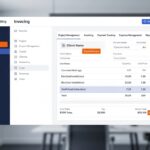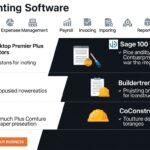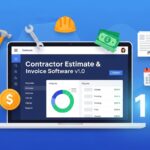Best Construction Invoicing SoftwarBest Construction Invoicing software
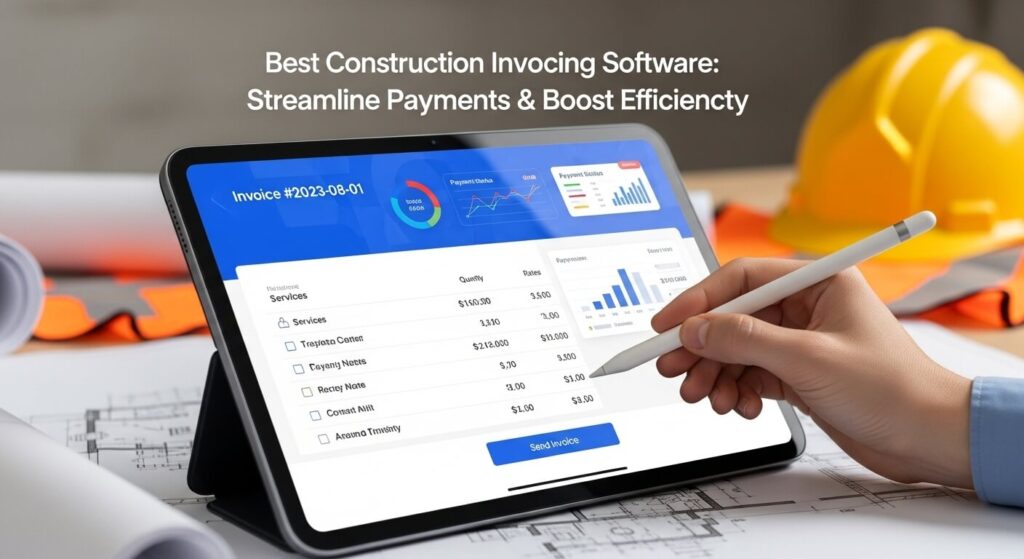
Table of Contents
Feeling bogged down by piles of invoices? Are slow payments holding back your construction projects? Many contractors struggle with managing complex billing. This often leads to cash flow problems and too much time spent on paperwork. Technology offers a clear solution. Specialized construction invoicing software can transform how you handle money.
This kind of software is built for the unique needs of the construction industry. It lets you create, send, and track all your invoices with ease. Its main goal is simple: get you paid faster and keep your books tidy. Imagine enjoying benefits like better accuracy, quicker payments, top-notch record-keeping, and a more professional business image.
Why Construction Businesses Need Specialized Invoicing Software
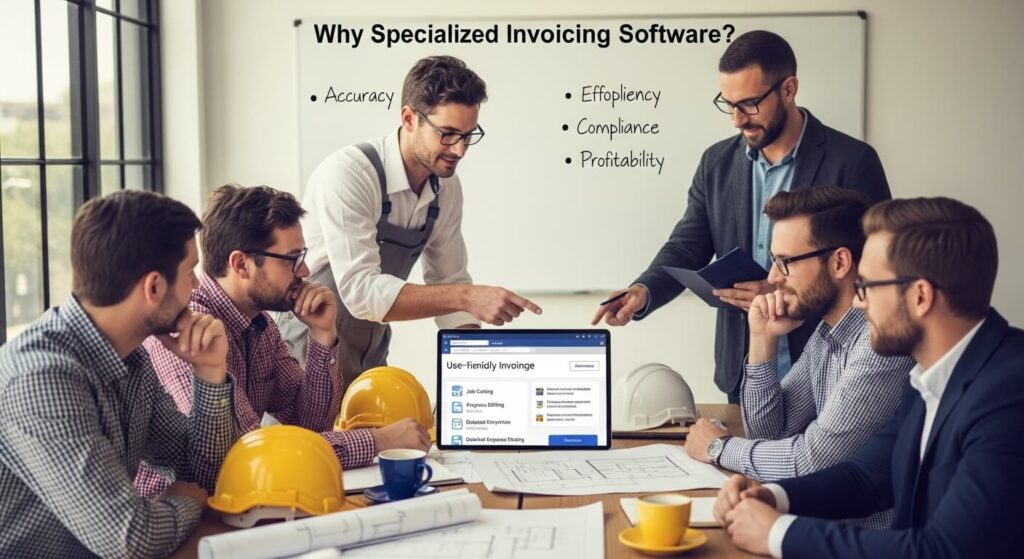
Managing Complex Billing Cycles
Construction projects come with unique payment challenges. Unlike a simple sale, you often bill for work completed over time. This includes various payment types like progress billing and handling changes. Your invoicing tool needs to keep up.
Progress Billing & Milestones
Construction often uses progress billing. This means you bill clients as the project hits certain completion stages. Good software makes this simple. You can easily create invoices based on what’s done, not just a fixed end price. This helps money flow in steadily.
Handling Change Orders
Projects rarely go exactly as planned. Change orders are common in construction. They add new work or alter existing plans. Specialized software ensures these changes are accurately added to your invoices. This way, you get paid for every extra task or material.
Retainage Tracking
Many contracts hold back a portion of the payment, known as retainage. This money is released after the project is fully complete and approved. The right software helps you track these retained amounts. It also reminds you when to invoice for them, so you don’t miss out on what’s owed.
Improving Cash Flow and Financial Predictability
Your business’s health depends on steady cash flow. Efficient invoicing directly impacts how quickly money comes in. This helps you plan better and avoid financial surprises.
Reducing Payment Delays
Chasing payments takes time and resources. Software with automated reminders can send polite nudges to clients. Offering online payment options also makes it easy for them to pay instantly. This can cut down payment times significantly. For instance, one small general contractor saw their average payment time drop by 15 days after using invoicing software.
Real-time Financial Visibility
How much money is due? Who owes you what? Dashboards and reports provide clear answers in real-time. You can quickly see outstanding invoices and understand your current revenue. This makes financial forecasting much easier.
Example
Consider a small roofing company. Before software, they spent hours each week chasing overdue invoices. After switching to a specialized system, their average payment time improved from 45 days to 30 days. This meant they could buy materials faster and take on more jobs.
Enhancing Professionalism and Client Relations
Your invoices are often a client’s final impression of your work. Professional-looking bills build trust. Clear, detailed invoices also prevent confusion and disputes.
Branded Invoices
Generic invoices can look cold and uninviting. Software lets you add your company logo, colors, and contact information. Branded invoices show you care about your image. They reinforce your brand and make your business look more established.
Clear and Detailed Invoices
Vague invoices cause headaches. Good software helps you break down costs clearly. You can list labor, materials, and services in detail. This transparency ensures clients understand exactly what they’re paying for. It reduces questions and speeds up approval.
Online Client Portals
Give your clients a convenient way to manage their bills. Online portals allow them to view, download, and pay invoices easily. This convenience improves their experience. It also frees up your team from answering basic payment questions.
Key Features to Look for in Construction Invoicing Software
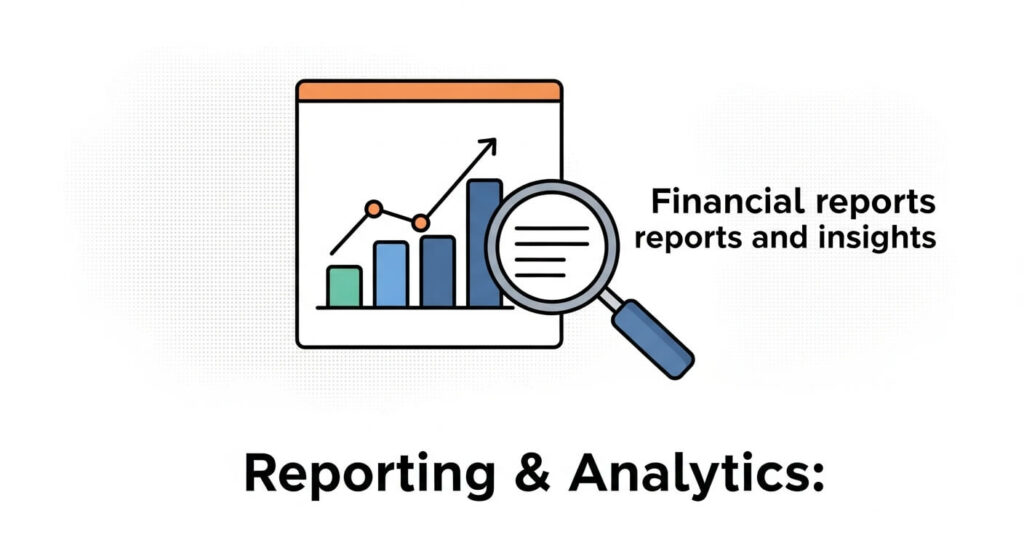
Choosing the right tool means knowing what features matter most. Some functions are essential for any construction business.
Core Invoicing and Billing Functionality
Every invoicing software should make it simple to create and send bills. Look for features that streamline this basic process.
Invoice Creation & Customization
The software should offer easy-to-use templates. These help you generate professional invoices quickly. You should also be able to customize them with your company’s branding. This ensures a consistent look across all your communications.
Estimating and Quote Integration
Why re-enter data? The best tools let you convert approved estimates or quotes directly into invoices. This saves time and reduces errors. It also ensures all agreed-upon work is billed correctly.
Recurring Invoicing
Do you handle ongoing maintenance or service contracts? Recurring invoicing automates billing for these regular charges. You can set it up once and let the software handle the rest. This ensures you get paid on time for continuous services.
Payment Processing and Management
Getting paid is the goal. How the software handles incoming payments is critical. Look for options that make it easier for clients to pay.
Online Payment Options
Offer flexibility to your clients. Software that supports credit card payments, ACH transfers, and other digital methods can speed up collections. Many clients prefer paying online, so make it an option.
Payment Tracking
It’s vital to know where every payment stands. The software should let you track the status of each invoice. You need to see which ones are open, paid, or overdue. This helps you follow up efficiently.
Automated Payment Reminders
Sometimes clients simply forget. Automated reminders can send polite follow-ups for overdue invoices. You can set the frequency and wording. This gentle nudge often prompts quick payments without you lifting a finger.
Project Management and Tracking Capabilities
The best invoicing software doesn’t just send bills. It ties into your larger project management efforts. This helps you see the full picture of each job.
Time Tracking Integration
Labor costs are a huge part of construction projects. Integrating time tracking means employee hours can be directly linked to specific jobs. This ensures accurate billing for all labor. It also makes payroll simpler.
Expense Tracking
Keep tabs on all project-related expenses. The software should let you associate material costs, subcontractor fees, and other outlays with specific jobs. This makes it easy to bill clients correctly and monitor project spending.
Job Costing
Understanding the true cost of each job is key to profitability. Good invoicing software often includes job costing features. It helps you compare estimated costs against actual expenses. This insight shows you which projects are most profitable.
Reporting and Analytics
Data provides power. Robust reporting features give you valuable insights into your business’s financial health. You can make better decisions with clear information.
Sales and Revenue Reports
Track your overall financial performance with ease. These reports show you how much money you’re bringing in. They can help you spot trends in sales and identify your busiest periods.
Accounts Receivable Aging
This report is essential for managing cash flow. It shows you which invoices are outstanding and how long they’ve been due. You can quickly see who owes you money and take action on overdue accounts.
Project Profitability Reports
Which projects made you the most money? These reports help you analyze the financial success of individual jobs. You can learn from past projects to bid smarter in the future.
Integration and Scalability
Your invoicing software shouldn’t be a standalone island. It needs to work well with your other business tools. It should also grow with you.
Accounting Software Integration
Connecting with popular accounting platforms like QuickBooks or Xero is crucial. This integration ensures financial data flows smoothly. It avoids manual data entry and reduces errors.
CRM and Project Management Tools
Does your company use other software for client relations or project planning? Look for invoicing solutions that can sync with these tools. This creates a more unified system for your business operations.
Scalability for Business Growth
Your business might start small, but it could grow quickly. Choose software that can handle increasing project volume and complexity. You want a tool that adapts as your needs change, without needing a full system overhaul.
Top Construction Invoicing Software Options (Examples & Comparisons)
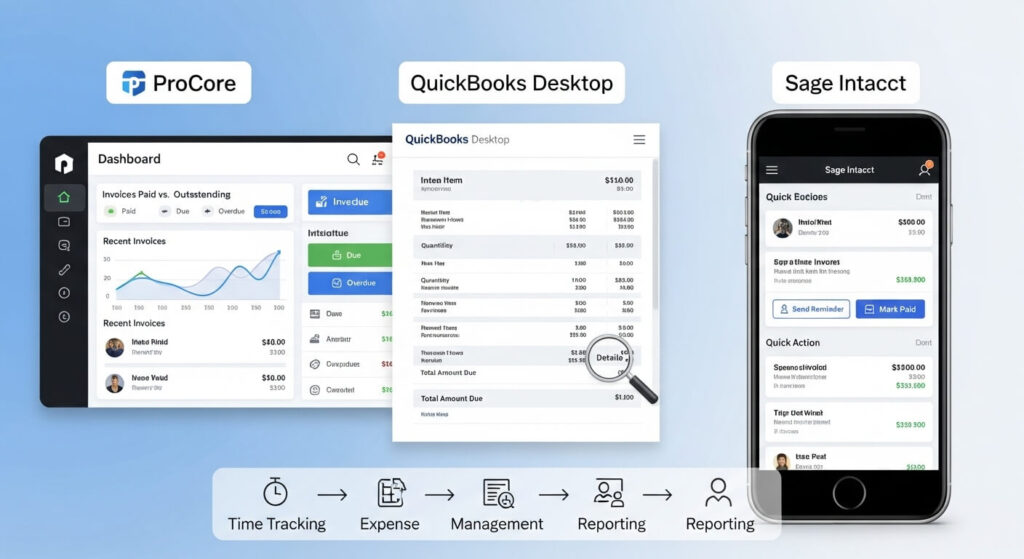
Many excellent software options exist for construction invoicing. Each offers unique strengths for different types of contractors.
ConstructInvoice Pro
This software is known for its user-friendly interface and strong project management tools. It’s often favored by small to medium-sized general contractors who need a simple yet powerful solution.
- Key Features: Robust progress billing, detailed expense tracking, and strong QuickBooks integration.
- Pricing & Plans: Offers tiered plans, starting with a basic option for single users and scaling up for larger teams.
BuildPay Manager
BuildPay Manager excels at handling complex billing scenarios, especially for larger commercial projects with many change orders. It targets larger construction firms or those with diverse project types.
- Key Features: Advanced retainage management, custom invoice approval workflows, and client-specific payment portals.
- Pricing & Plans: Typically enterprise-focused, with custom quotes based on user count and required features.
JobFlow Invoicer
JobFlow Invoicer offers a balanced approach, combining easy invoicing with decent job costing features. It’s a solid choice for specialty contractors like plumbers or electricians. They often manage multiple smaller jobs.
- Key Features: Quick invoice generation from estimates, mobile app for on-site time tracking, and helpful financial reports.
- Pricing & Plans: Subscription-based pricing, with a free trial available and clear pricing tiers for different business sizes.
How to Choose the Right Construction Invoicing Software
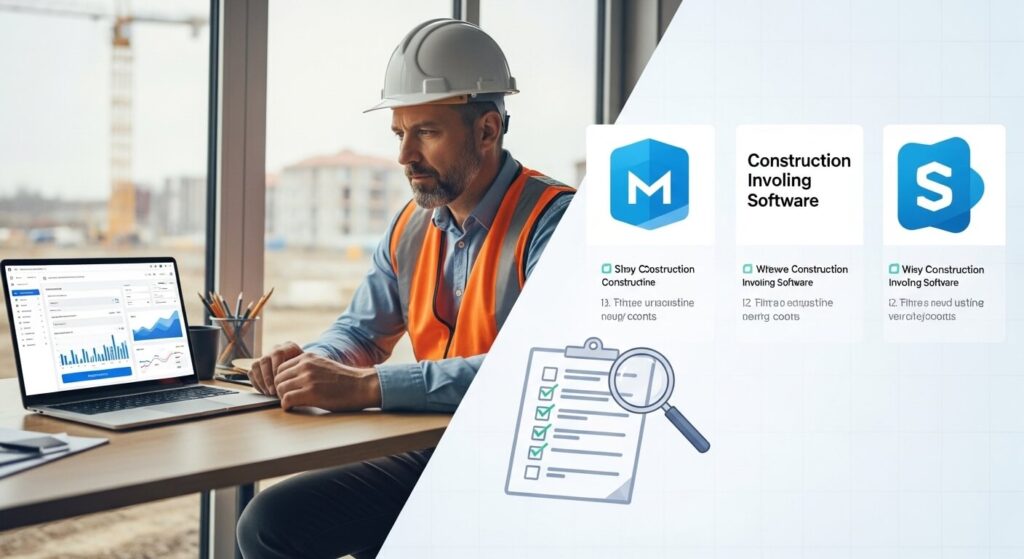
Finding the perfect fit means taking a good look at your own business. Don’t just pick the flashiest option.
Assess Your Business Needs
Start by understanding what problems you need to solve. What are your biggest headaches right now?
Identify Pain Points
Are delayed payments your main issue? Is tracking change orders a nightmare? Pinpoint your specific challenges. This will help you focus on features that truly matter.
Determine Budget
Software costs vary widely. Decide what you can realistically afford each month or year. Remember to factor in potential training costs too.
List Essential Features
Make a list of “must-have” features versus “nice-to-have” ones. Prioritize the functionalities that will make the biggest difference to your daily operations.
Evaluate Ease of Use and Support
Even the best software is useless if no one can figure out how to use it. User experience and customer help are vital.
User Interface (UI) & User Experience (UX)
Is the software intuitive? Can you easily navigate through its features without getting lost? A clean, simple layout makes learning much faster.
Training and Onboarding
What resources does the vendor provide to help you get started? Look for good tutorials, videos, or even dedicated onboarding sessions. Smooth training gets your team up to speed faster.
Customer Support
What happens when you hit a snag? Check the quality and availability of customer support. Do they offer phone, email, or chat support? How quickly do they respond?
Leverage Free Trials and Demos
The best way to know if software is right for you is to try it out. Don’t commit without a test drive.
Testing Core Workflows
During a free trial, practice your main tasks. Create an invoice, track a payment, and run a report. See if the software handles your specific needs smoothly.
Involving Your Team
Get feedback from the people who will actually use the software every day. Their insights are invaluable. They can spot issues or suggest features you might overlook.
Asking Key Questions
Prepare a list of questions for the vendor during demos. Ask about specific scenarios unique to your business. This helps ensure the software can handle your real-world challenges.
Conclusion
Choosing the right construction invoicing software is a smart move for any contractor. It means less time on paperwork and more time building. You’ll see better cash flow, smoother operations, and a more professional image. By carefully evaluating your needs and exploring the best options, you make a solid investment. This investment pays off in the long-term success and stability of your construction business.

